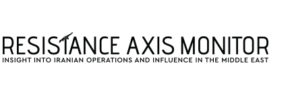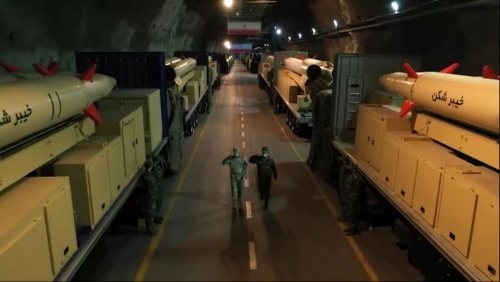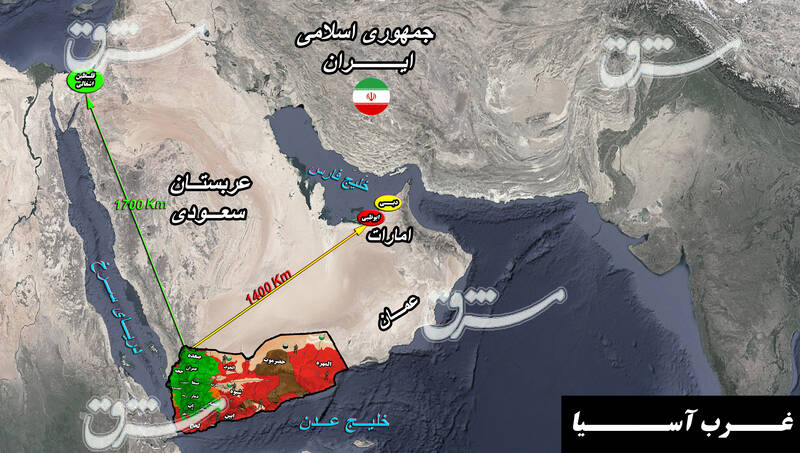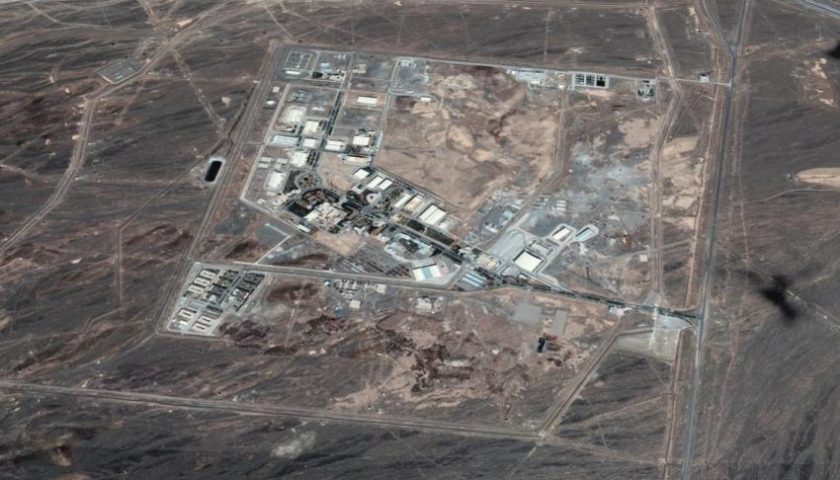The Resistance Axis Monitor News Bulletin delivers periodic rounds ups of important developments from Arabic, Hebrew and Persian sources that have not been covered or covered as extensively in Western reporting. While the bulletin focuses on Iranian regional intervention and its proxies in the Middle East, this coverage extends beyond to include politics, military, society and culture.
Iran
Intelligence Minister: Mole Who Helped Assassinate Fakhrizadeh Was ‘Member of Armed Forces’ During a state television broadcast on 8 February, Intelligence Ministry Mahmud Alavi criticized attacks on the ministry over the assassination of “armed forces member” Mohsen Fakhrizadeh, saying that the mole who helped orchestrated the attack was “a member of the armed forces,” and that “we are unable to gather intelligence on the armed forces” (he apparently made an indirect reference to the Islamic Revolution Guard Corps (IRGC)). Alavi said that ministry had warned about a plot on two occasions, 2 months and 5 days before the attack, knowing the location of the hit but not its time. He added that “we asked the armed forces to introduce a person to work [with us] on the matter [mole], but unfortunately assassination happened.” Fakhrizadeh, who was also a nuclear scientist, was killed in November 2020. (Fararu)
Cancellation of Meeting With Putin Leads to Controversy for Parliament Speaker On 6 February, Iranian media and a member of Parliament reported that Parliament Speaker Mohammad-Baqer Qalibaf canceled his planned meeting with Russian President Vladimir Putin while on a trip to Moscow because he refused to accept the Kremlin’s COVID-19 protocol, which reportedly involved a demand that Qalibaf, who had contracted the disease last year, self-isolate for 15 days before meeting Putin. Prior to departing for Russia, Qalibaf had said that he was carrying an important letter penned by Supreme Leader Ayatollah Ali Khamene’i addressed to Putin. Qalibaf instead delivered the letter to Russian Federation State Duma Chairman Vyacheslav Volodin Viktorovich be passed on to Putin. There is speculation in Iranian media that Qalibaf, who was previously Tehran mayor and an Islamic Revolution Guard Corps (IRGC) commander, may make another bid for presidential race slated for June.
Qalibaf later told a Russian news agency that Khamene’i’s letter was very important, and that the goal of his trip was to help elevate bilateral cooperation to a “strategic” level. He added that strategic cooperation would allow the two to “complete each other in various fields.” Saying that parliaments can play effective roles in this regards, he added “we’re thinking about 20-year and 50-year cooperation.” He noted that change in the White House would not affect bilateral ties between Russia and Iran. Saying “strategic” ties began in Syria intervention, he also hailed cooperation in UN Security Council, the International Atomic Energy Agency (IAEA) Board of Governors, and the Eurasia Economic Union. The Parliament Speaker noted that despite “positive” political and security cooperation, bilateral trade was not at a satisfactory level.
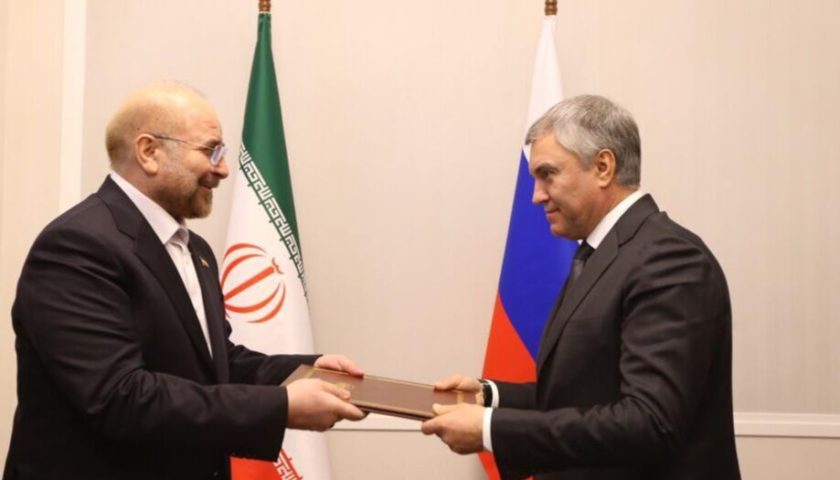
The cancellation of the meeting with Putin led to criticism of Qalibaf in Iran including among some Principlists, or those who profess commitment to the Islamic revolution’s principles. Centrist conservative daily Jomhuriy-e Eslami and Principlist MP Hossein Naqavi-Hosseini agreed that Qalibaf should have canceled his trip. Going further, Mohammad-Javad Azari-Jahromi – Information Technology and Communications Minister, and former Intelligence Ministry agent – said during an event in Iran that Islamic Republic founder Grand Ayatollah Ruhollah Khomeini had said that just as Tehran should distrust the White House, placing hope in the “Kremlin is not a correct strategy.” Jahromi’s comment raised criticism from several Principlists and Ruhani administration critics like hardline daily Javan managing director Abdollah Ganji, who said that Khomeini’s ire was toward communism and socialism, and indirectly accused the Ruhani administration of trying to placing its hope in the White House. Qalibaf accused his critics of being “West-oriented” who do not want Iran to have good relations with Russia and China, a line of criticism that hardline daily Kayhan, the chief editor of which is appointed by the Supreme Leader, agreed with. Kayhan, however, noted that there were no reports about a meeting with Putin until Qalibaf himself mentioned it before departing, and that he rejected the “hard” COVID-19 protocol set by Putin. Qalibaf claimed that Khamene’i insisted that he deliver the letter to Russia even as he wanted to delay the visit. Foreign Ministry Spokesman Sa’id Khatibzadeh said that the meeting with Putin was not set in stone before Qalibaf’s visit, and that it was an “important” diplomatic visit, going on to criticize “partisan” attacks on the trip. Several hardline newspapers praised Qalibaf’s visit to Moscow that involved meeting with a number of Russian officials; daily Javan called it “Iran, the harbinger of new global order from the East.” (Iran International, Javan, Tasnim News, Radio Farda, Ebtekar, Kayhan)
Iran and Russia Sign Cyber Security Cooperation Agreement On 26 January, Russian and Iranian foreign ministers Sergey Lavrov and Javad Zarif signed an agreement on cyber security cooperation, Lavrov said that “The document gives us the opportunity to coordinate our activities given the growing importance of cyber issues and their increasing impact on international relations, as well as on situations in various countries.” Zarif signed the agreement while on a diplomatic tour in the Caucuses and Russia. (TASS)
Judiciary Chief Ra’isi Visits Iraq, as Khamene’i Issues Letter To ‘Iraqi Youth’ On 8 February, Judiciary chief Ebrahim Ra’isi visited Iraq to sign a number of Judiciary-related agreements including “pursuing” investigations into the assassinations of former Qods Force chief and his lieutenant Abu Mahdi al-Muhandis. Ra’isi visited the location where the pair were killed, and condemned the US in an address, saying that the US created ISIS, and that “martyrs” Soleimani and Muhandis are “more dangerous” than where they were alive. He also met with Iraqi Prime Minister Mustafa Kadhimi on 9 February in order to “boost” bilateral ties.
Islamic Republic media framed gatherings of Iraqis welcome Ra’isi as “Iraqi people” giving “warm” reception to him. Photos of Soleimani and Islamic Republic founder Grand Ayatollah Ruhollah Khomeini were seen among the people who gathered. On 9 February, media reported that Khamene’i issued a short letter to “Iraqi youth,” written in Arabic, saying that “I love you very much and am praying for you…I give you promise of a bright future for Iraq; a future built by you and your sublime will.” (ISNA, IRNA, Jahan News)
Recent Iran-Taliban Talks Grab Headlines: Hailed by IRGC-Linked Daily, Hardline Analyst Iran’s Foreign Minister Mohammad Javad Zarif and Ali Shamkhani, Supreme National Security Council secretary, met with a high-ranking Taliban delegation, led by Abdul Ghani Baradar, this past week to discuss the Doha peace agreement signed in February 2020, among other issues. The visit follows recent reports of increased violence attributed to the group, as well as resumed peace talks between the Afghan government and Taliban leaders.
In a meeting held on 27 January, Shamkhani said Iran would “never recognize a [political] current that seeks to gain power in Afghanistan through war,” and emphasized that Iran would support a government elected “through the real participation” of the people of Afghanistan. Following the meeting, Shamkhani tweeted that, Taliban leaders are “determined” to fight the United States in Afghanistan. Zarif, who met with Baradar on 30 January, echoed Shamkhani’s remarks, saying that Iran was prepared to support the formation of a “comprehensive government, with the presence of all ethnic and political groups in Afghanistan.” He added that, establishing peace in Afghanistan would “remove the pretext for the presence of occupiers [a reference to foreign military forces]” in the country.
Following the meetings, Soheil Shahin, a Taliban spokesman, said the Taliban supports an inclusive government and is “not seeking a monopoly of power.” Responding to a question regarding the future of talks, Shahin said, “we are committed” to the Doha agreement, but added that according to the agreement, the presence of US troops in the country after 14 months is considered an “occupation of Afghanistan.”
Defending talks with the Taliban, member of Parliament Ahmad Naderi said that the new generation of the group is first “brutal” generation, and that it no longer has significant ties to Saudi Arabia and Pakistan. Naderi indirectly implicated Pakistan in the 1998 massacre of Iranian diplomats that almost led to war. Naderi added “In the current situation, our relationship with the Taliban is based on the principle of ‘The enemy of my enemy is my friend.’ We and the Taliban have a common enemy, and that is the United States.”
The Taliban delegation held a press conference in Iran. Political Desk in Qatar Spokesman Soheil Shahin said the Taliban wouldn’t discriminate against Shiites in the future “Islamic emirate.” He also said that the 1998 massacre was “a painful event.” Shahin said Taliban wouldn’t oppose women “with hejab” working.
The recent talks grabbed Iranian media headlines, as papers and analysts discussed the US’ role in the peace agreement. The state-run Iranian Student’s News Agency (ISNA) commented that the “six-month extension” of the US envoy to Kabul’s mission, “shows that [President Joe] Biden will continue to follow [former US President Donald] Trump’s lead in Afghanistan and remains committed to the Doha agreement.” On the other hand, hardline newspapers, including IRGC-linked Javan, cautioned against “repeating” the “unpleasant experience” of talks regarding the Iran nuclear deal, pointing to efforts by the Biden administration to “reconsider” the Doha peace agreement. Javan said that the Taliban has sent delegations to Iran, China, and Russia to “negotiate with Washington’s rivals and press the new Biden administration to reach an agreement.” Javan also speculated that the Ruhani administration is seeking to “link” Afghan’s negotiation process with the Biden administration to Iran’s “return to the JCPOA.” Furthermore, hardline analyst Abdollah Ganji defended the recent talks, saying that Iran may oppose some of the Taliban’s goals, but that, if engaging with the Taliban will “weaken [ISIS], ensure the safety of Shiites, and deprive the Americans of a good night’s sleep, it is necessary and the [Ruhani] administration must leave that [option] open.” (ISNA, IranWire, Tasnim News, Javan, Tehran Times, Didban Iran)
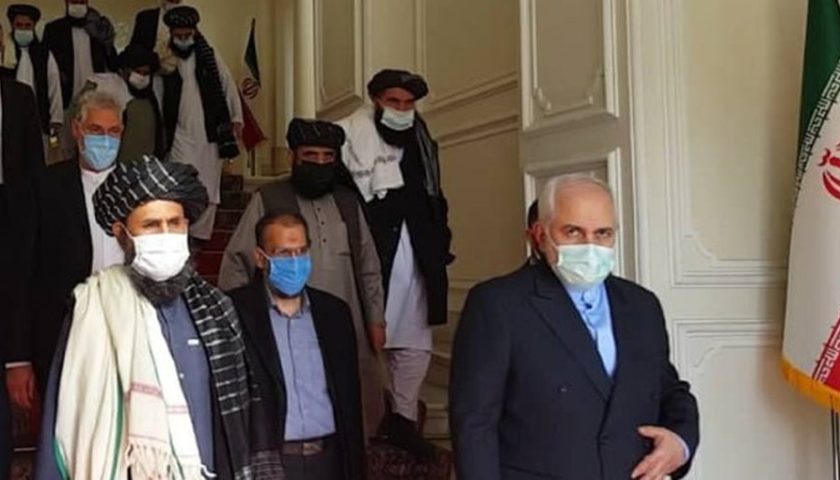
Fatemiyoun Division Circulates Video in which Taliban Delegation Promises It Wouldn’t Discriminate Against Shiites On 3 February, an official social media account of the IRGC-led Afghan Fatemiyoun Division released a video from a Taliban press conference in Tehran in which Taliban delegation was asked how it would treat Shiites post-American withdrawal. The Taliban delegation said it would not discriminate against them. (Telegram)
Iranian Ambassador to Ansarallah Says Biden Admin Has ‘Different Policy Towards Yemen Than Its Predecessors’ On 5 February, Iranian Ambassador to Ansarallah (Huthis) tweeted in reaction to the White House announcement on stopping U.S. involvement in offensive Saudi Operations in Yemen, saying “The US is a great devil & we are not optimistic about what they say. Certainly the new government has a different policy towards Yemen than its predecessors. We should hope to the God & people of Yemen that they had historical resistance & stability & will continue until victory.”(Twitter)
Hardline Daily Calls US Yemen Announcement Component of Plan To Create Alliance To Contain Iran On 6 February, hardline daily Khorasan published an editorial analyzing America’s announcement on Yemen war, speculating that it is part of a long-term plan to “create a coalition of regional countries” in order to “control and pressure Iran.” (Khorasan)
Zarif Goes on Caucuses, Russia Tour, Reports Positive Steps With Turkey, Azerbaijan In late January, Foreign Minister Javad Zarif went on a diplomatic tour to Russia, Armenia, Georgia and Azerbaijan to discuss regional cooperation. He said that Tehran-Baku cooperation “have been very good” in recent months, and that “we are happy” Azerbaijan “retook its lands” in the recent conflict. The Iranian and Azerbaijanis discussed trade and transit issues.
On 29 January, Zarif held a press conference with his Turkish counterpart, saying that the two sides discuss energy, transit and challenges facing companies. He expected hope that bilateral trade ties would expand. He said that Tehran and Ankara have had “very good relations during difficult times,” and that the two sides face good opportunities to cooperate in Syria and the Caucuses. He added that the two sides discussed a trilateral Afghanistan-Turkey-Afghanistan summit. Zarif noted that a “more rational position” by the U.S. would allow the expansion of Iranian and Turkish ties.
The general tone in Iranian media toward Turkey, however, has not been as positive. For instance, an editorial in Reformist daily Sharq expressed alarm that Turkish President Recep Erdogan has stoked Azeri separatism in Iran by reciting a poem in Baku that lamented the separation of the Azeris between the Aras river. (Defa Press, Khabar Online, Sharq)
IRGC Weekly Publishes Special Reports on Chinese, South Korean Progress On 1 February, IRGC weekly Sobh-e Sadeq published a series of reports discussing China’s development and progress. Parliament National Security and Foreign Policy Committee spokesman Abolfazl Amo’i wrote that the West “hoped it could” transform China to a “liberal country” after “improvement in its economic condition” but that China pursued its own model instead. An East Asia analyst wrote that the Chinese Communist Party has “used patriotism to reach its goals,” and that successfully mobilizing nationalism has helped it develop and progress. Another analyst credits Chinese progress with pursuing a policy of “international co-existence,” leading to Chinese exports surpassing America’s. An economics analyst penned that Chinese progress is deeply rooted in Confucius philosophy of moderation and pragmatism, and preserving own identity based on independence.
On 8 February, Sobh-e Sadeq analyzed South Korea’s development. Parliamentary Budget and Planning Committee member Mohsen Zanganeh credited South Korean “competent” and faithful managers, and that South Koreans “implement the principles that we accept in Islam.” He lamented that “we do not implement the recommendations” of Islam. A Tehran University Science Board Member told the weekly that South Korea’s progress lies in competent managers, social order, codified program, and successful diplomacy. An East Asia analyst emphasized South Korea work ethic that contributes to a “development culture.” A reporter penned that East Asia’s economic boom in general was owed to governments that orchestrated economic progress. It added that while “development governments” may not necessarily have democratic legitimacy, they ultimately should gradually transfer power to civil society to encourage private sector growth. (Sobh-e Sadeq)
Lebanon
Anti-Hizballah Activist Lokman Slim Murdered in South Lebanon Lebanese activist and Hizballah critic Lokman Slim was found dead in his car with five gunshot wounds in south Lebanon last Thursday, judicial and security officials said. The 58-year-old was found dead in the driver’s seat of his car, near the village of Addousiyeh, in south Lebanon. Lead investigator Judge Raheef Ramadan ordered removal of his body to a government hospital in the city of Sidon where a forensic coroner reported he was hit with five bullets. According to some reports, he was shot four times in the head and once in the back. Others indicated he was shot thrice in the head, once in the chest, and once in the back.
Preliminary information suggests he was killed between 2 am and 3 am, several hours after setting off in his car the previous evening. A security official at the scene said Slim’s ID, phone and gun were missing.
Slim’s murder was roundly denounced, including by Hizballah – but only belatedly. In a terse statement, the group stated that it “condemns the murder of political activist Lokman Slim” and asked “the relevant judicial and security authorities to quickly uncover and punish the perpetrators, as part of combatting murderous crimes going on in various parts of Lebanon, and the accompanying political and media exploitation [of Slim’s murder] at the expense of domestic security and stability.” In other words, Hizballah’s statement was an attempt to downplay the political significance of Lokman Slim’s murder, and a demand that Lebanese authorities clamp down and silence anyone criticizing the group or blaming it for his killing. The group’s Al-Ahed newspaper also carried a statement quoting members of the Slim family in the Haret Hreik neighborhood of south Beirut who condemned “the exploitation [of the murder] by mouthpieces of strife who are preempting [the results of] investigations by directing accusations left and right.
Hizballah’s propaganda organs also quickly went into action to deflect that blame, which did indeed come. The group began suggesting that Slim’s assassination was a false flag operation by the United States Embassy in Beirut or the Gulf States, couple with an orchestrated media campaign, to undermine Hizballah’s image. Some outlets affiliated with Hizballah’s also directed blame at the Israelis. Al-Manar tried to suggest that Mossad had orchestrated Slim’s killing to tarnish the group’s reputation. Al-Manar – based on a tweet from an account purporting to belong to former Israeli Prime Minister Ehud Olmert (@olmert_e) that praised Mossad’s actions against Israel’s enemies – asked in an article “is this implicit admission by Israel of involvement in new attempts to undermine Hezbollah’s image by attacking its critics, then accusing it of responsibility?”
Relatedly, U.S. Ambassador to Lebanon Dorothy Shea released a video statement condemning what she called Slim’s “barbaric assassination.” However, Ambassador Shea stopped short of suggesting who was responsible for his murder. At no point in her statement did she mention Hizballah at all, or Slim’s antagonistic relationship with the group. U.S. Secretary of State Anthony Blinken issued a similar statement, also failing to mention Hizballah, even though he noted Slim’s political activism, which was directed against the group. (Al-Manar, Twitter, Al-Akhbar, Al-Ahed)
Yemen
Huthis Continue Offensive Operations in Central Yemen Yemen’s Ansarallah (Huthis) continued their offensive operations this week. According to state-run SABA News, the Huthis “targeted residential neighborhoods in the central Yemenis city of Ma’rib, which is filled with displaced persons, with two ballistic missiles over the past 12 hours, which landed in empty areas.” An unnamed security source told SABA that the Huthis had fired a total of 8 ballistic missiles at Ma’rib in the previous 48 hours, killing four people and wounding 12. The group also launched several drones carrying explosives at the city, two of which were downed. The security source claimed the missile strikes coincided with “a widespread military escalation against the governorate of Ma’rib on all fighting fronts that has been ongoing since last Sunday, after the new U.S. administration reversed the terrorist designation,” on the group, applied by the Trump administration.
Huthi forces also admitted to targeting military aircraft hangars at Saudi Arabia’s Abha International Airport with four Samad-3 and Qasef-2K drones. A Saudi-led coalition spokesman said that the strike had set fire to a civilian aircraft, but that the blaze was subsequently brought under control. A Huthi spokesman said the strike came in response to the “continued aerial bombardment and brutal blockade against Yemen.” He also said the “aggressor Saudi regime” had ignored all of the group’s previous warnings not to use its civilian airports for military purposes. He said such operations would continue “so long as the aggression and blockade continue.” Mohammad Abulsalam, the head of the National Delegation, said the attack was part of Ansarallah’s “legitimate defense” which would “continue…with all of our capabilities…until the aggression and siege end completely.” (SABA, Al-Jazeera, Al-Masirah)
Freelance Iran analyst Diana Timmerman contributed to this bulletin.
